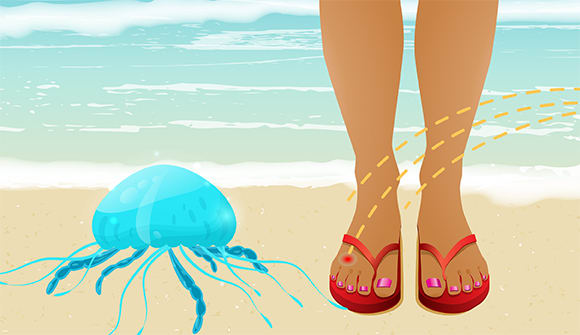To pee or not to pee?
With jellyfish stings, that is the question.
Article Author: Wesley Roberts
Article Date:

If you’re hitting the beach this summer, you might need to add a new item to your packing list. When you throw in the beach towels, sunscreen and sunglasses, consider adding vinegar to be ahead of the dreaded jellyfish sting.
There’s nothing worse when you’re swimming along to be shocked by the sharp sting of the drifting marine animal.
As a nurse practitioner at the Baptist Health Clinic at Walgreens, co-owner of a surf camp and a mom, I’m interested in helping beach-goers bust myths about the treatment of jellyfish stings.
Tiny or enormous, jellyfish come in all shapes and sizes. Some have tiny stinging cells called nematocysts in their tentacles. A jellyfish sting is like a thousand tiny spears injecting you with poison all at once. The jellyfish tentacles have millions of lances embedded in the nematocysts, which launch the stingers out into your skin upon contact. They latch on and let loose a stream of venom, which can be mildly annoying, extremely painful or even life threatening. No matter the severity, a sting can pretty much ruin a beach day in an instant.
Age-old myths
- It turns out urinating on the sting site won’t help. Urea, found in urine, helps with tentacle removal but urine is too diluted for it take away the sting.
- Don’t rinse with cold water, which can cause the stingers to release more venom.
- Baking soda isn’t dangerous, but it doesn’t help much either. Some people think baking soda neutralizes the venom but other remedies are more effective.
- Trying to scrape away the tentacles can cause the jellyfish nematocysts to release more venom, which are triggered in part by pressure.
- Alcohol isn’t a good idea either as it can cause nematocysts to fire more.
- Rinsing with sea water might actually make the pain worse as well.
Ouch! What do I do?
Following a sting, take these steps as quickly as possible:
- Pour highly concentrated vinegar on the sting site. Vinegar deactivates the jellyfish’s nematocysts so they can’t fire.
- Remove the tentacles with tweezers or a gloved hand while continuing to rinse with vinegar.
- Apply a heat pack or immerse the affected area in water of a temperature at least 113 degrees Fahrenheit for 40 minutes.
- Stay out of the water for the rest of the day. Remember, salt water may make the pain worse.
Pharmacies also sell commercially packaged products for stings, like StingNoMore®, which contain highly concentrated vinegar and urea.
If the itching continues
If the jellyfish sting causes pain and itching for a few days:
- Apply hot packs to reduce swelling and inflammation.
- Take pain relievers such as acetaminophen or ibuprofen.
- Apply a topical antibiotic cream, such as Neosporin® to reduce your risk of infection.
- Take an over-the-counter antihistamine (i.e., Benadryl® or Zyrtec®).
- Ensure you are up to date on your tetanus vaccine if the sting creates an open wound.
Doc or not?
Jellyfish stings are more dangerous for those will jellyfish allergies, individuals with compromised immune systems, or very young or very old people.
Any sign of shock or an allergic reaction warrant prompt emergency care. Call 911 or go to an emergency department. Warning signs may include:
- Difficulty breathing
- Rapid heart rate
- Dizziness
- Rapidly spreading rash
- Nausea
- Changes in consciousness or muscle spasms
People with allergies, especially to insect stings, should always carry an EpiPen®.
When a sting is not an emergency but there have been reports of highly venomous jellyfish in the area; the jellyfish was very large; there are numerous tentacles at the sting site; or the sting was to the eye or mouth, seek immediate medical care.
For your next trip to the shore, pack vinegar!
Our guest columnist is Lyndsay Holmes, MSN, ARNP, clinic manager, Baptist Health Clinics at Walgreens. For emergency care, call 911 or visit one of Baptist Health’s emergency rooms, open 24/7. For quick care options, visit BaptistCareNow.com.



